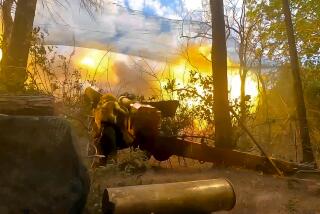Quick NATO Action Unlikely in Kosovo; Rebels Lose Base
- Share via
PRISTINA, Yugoslavia — Ethnic Albanian separatist guerrillas have lost a key base in Kosovo as prospects recede for any quick NATO military action in the Serbian province.
The Kosovo Information Center, linked to the leading pro-independence ethnic Albanian party, said Saturday that Serbian forces swept into the hill village of Likovac on Thursday night after hammering it with artillery for two days.
Serbian troops, in a scorched-earth policy against guerrilla strongholds, turned Likovac and nearby hamlets “into a bonfire,” the center said.
It was the latest setback for the Kosovo Liberation Army, or KLA, which has been driven into remote hills after winning loose control of up to half the province a few months ago.
Tens of thousands of villagers fled with KLA fighters to escape shelling. Many of their abandoned homes and shops have since been firebombed and looted and their fields set ablaze.
The North Atlantic Treaty Organization has drawn up plans for possible airstrikes to check Serbian military operations against Kosovo’s ethnic Albanians. But quick action appeared unlikely after a telephone call Saturday between French President Jacques Chirac and President Clinton.
Spokesman Jerome Peyrat said Chirac had told Clinton that there could be no military operation without the backing first of the United Nations’ Security Council.
Peyrat said the two leaders agreed that they would need Russian approval before launching any NATO action.
*
Russian Deputy Foreign Minister Nikolai Afanasievsky has made it clear that Moscow is opposed to military action.
“No one can win a war in Kosovo, and no one has yet explained what any foreign military interference would bring to that region and people there,” Afanasievsky said in Belgrade, the Yugoslav capital, after four days of shuttle diplomacy.
He said the Contact Group--Britain, Germany, France, Italy, the United States and Russia--had agreed on a proposal that envisages “a high level of autonomy for the province” while keeping the territorial integrity of Yugoslavia. The group has been trying to secure a political solution for Kosovo since fighting between Serbian forces and the KLA escalated in March.
“The international community is unanimously against the independence of Kosovo,” the Russian envoy said.
International powers have rejected independence for Kosovo, fearing that it would encourage extremist groups to annex parts of Macedonia and the smaller Yugoslav republic, Montenegro, to form, along with Kosovo, a “Greater Albania.”
Brian Donnelly, the British ambassador to Belgrade, handed the Contact Group’s proposal to the Serbian side Friday and to the ethnic Albanians in the provincial capital, Pristina, on Saturday.
Yugoslav President Slobodan Milosevic has said he is ready to negotiate with the Kosovo separatists on autonomy, but feuding ethnic Albanian politicians have been unable to agree on their negotiators.
In Pristina, ethnic Albanian leader Ibrahim Rugova said dialogue on peace is impossible as long as Serbian forces pound separatist guerrillas and nearby villages.
The Kosovo Information Center said that most civilians in Likovac and adjacent hamlets were evacuated before Serbian military police moved in but that some people were believed to be holed up in the area.
Security forces are also closing in on KLA redoubts in the far west, notably the town of Junik, which is perched at the high end of a road that climbs westward into the heart of a wooded mountain range marking the border of Albania.
On Saturday, heavily armed military police occupied virtually every building along the main road between Pec and Djakovica paralleling the border mountains, betraying high tensions in the region.
Also Saturday, a war crimes suspect wanted by the U.N. tribunal for atrocities committed during the Bosnian war died in a bar brawl in Serbia, police said.
Slobodan Miljkovic was shot Friday night in a barroom melee in his hometown of Kragujevac, 60 miles southeast of Belgrade, police said.
Miljkovic, 36, was under indictment by the U.N. tribunal in The Hague for war crimes and crimes against humanity carried out in northeastern Bosnia in 1992.
Reputed to have ties to organized crime before the 1992-95 war, Miljkovic returned after the war to Serbia, where authorities were unwilling to extradite him to The Hague.
In the last six weeks, two other Serbian suspects have died in tribunal custody: one of a ruptured aorta, the other by suicide.
More to Read
Sign up for Essential California
The most important California stories and recommendations in your inbox every morning.
You may occasionally receive promotional content from the Los Angeles Times.













